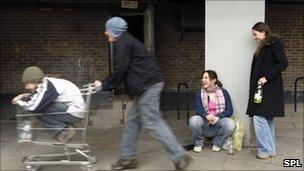Teenage therapy 'reduces binge drinking'
- Published

Substance use can start in adolescence
Using teacher therapists to identify problem personality traits in teenagers, and help them understand their behaviour, could be the key to stopping them binge drinking and taking drugs.
Adolescent alcohol consumption has more than doubled in the past decade and 15% of pupils reported taking drugs last year.
Addiction experts believe prevention is the key - stopping young people abusing drink and drugs before they start, instead of simply treating the addiction once it has taken hold.
Researchers at the Institute of Psychiatry at King's College, London, asked more than 1,000 13-year-olds at secondary schools in London to answer a range of questions about their personalities.
They were looking for pupils with four problem personality traits: negative thinking, anxiety, impulsiveness and sensation seeking.
Half of those teenagers were then given two tailored therapy sessions - one 90 minutes long, the second an hour. In small groups teenagers with particular personality traits were encouraged to explore their personalities - including strengths and difficulties.
They were encouraged to think about other ways to deal with the risks associated with that behaviour - techniques they hope the teenagers will then use when they come face to face with drink or drugs.
"It's about coping with the trait rather than changing the personality - in no way do we ever suggest they stop being who they are or change who they are," says Dr Patricia Conrod, Consultant Clinical Psychologist at King's College.
"It's changing how it is they're coping with who they are and perhaps capitalising on some of the more positive sides of the trait and learning to manage some of its more difficult sides."
The results, they say, speak for themselves - one study of 13 to 16-year-olds led to a 40% reduction in binge drinking and cut the chance of teenagers taking cocaine by 80%. It is the first school based programme outside the US to successfully prevent alcohol uptake and misuse in teenagers.
Students asked to give feedback about the sessions told the researchers they helped with controlling anger and dealing with negative thinking.
A second trial then looked at whether ordinary teachers, with no psychiatric training, could be taught to deliver the sessions.
Focusing on more than 20 secondary schools and another thousand pupils, it found that with little training: a three day workshop followed by three hours of supervised practice; teachers could do as good a job as the professionals.
Latest figures show that alcohol misuse currently costs the NHS around ВЈ2.7bn a year. Charities say as successful as treating an addiction can be, most do begin in adolescence, hence the need to attack the problem before it even exists.
"Prevention is important because we need to stop people progressing to much severer problems later in life," says Nick Barton, the Chief Executive of Action on Addiction, who helped fund the study.
"We find for instance in our treatment centres that when we assess drinking or drug use history, that very often the onset was way back in adolescence, sometimes as young as 11 but certainly the period between 11 and 16 was when the first attraction to substance use took hold."
The researchers believe this programme could be delivered with just two well trained counsellors per borough who would teach school staff how to lead the sessions.
It will cost money, they say, but in the long run a little bit of investment now to stop another generation of binge drinkers could save the NHS millions in the future.